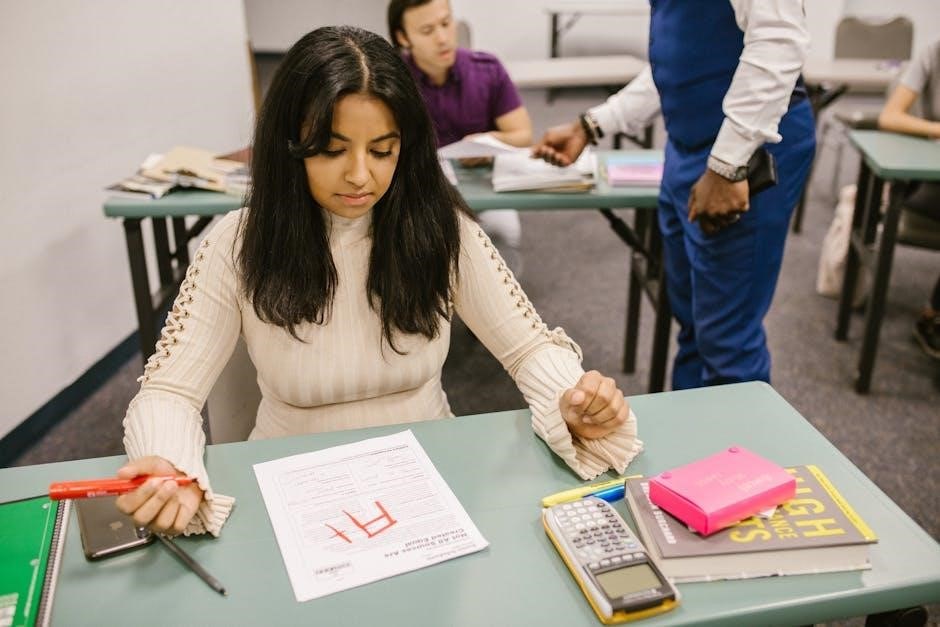nys notary exam study guide free

The NYS Notary Exam is a crucial step to becoming a certified notary public in New York State, ensuring knowledge of laws, procedures, and ethical practices. Passing this exam demonstrates your readiness to serve as a trusted public official, facilitating legal document executions with integrity and accuracy. This guide provides essential insights and resources to help you prepare effectively for the exam and succeed in your notary career.

1.1 Overview of the New York State Notary Exam
The New York State Notary Exam is a standardized test designed to assess an individual’s knowledge of notary duties, laws, and ethical practices; Administered by the New York Department of State, the exam ensures candidates understand their role in verifying identities, witnessing document signings, and maintaining the integrity of legal processes. The exam consists of multiple-choice questions covering essential topics such as notary responsibilities, signature verification, and state-specific regulations. Passing the exam is a mandatory step to become a certified notary public in New York. It is designed to uphold the professionalism and accountability required of notaries, ensuring they can perform their duties accurately and ethically. Preparation is key, as the exam evaluates both legal knowledge and practical application.
1.2 Importance of Becoming a Notary in New York
Becoming a notary in New York is a valuable professional step, offering numerous benefits and opportunities. As a notary public, you serve as an impartial witness to document signings, ensuring legal integrity and protecting individuals from fraud. This role is essential in various industries, including law, finance, and real estate. Notaries in New York are in high demand, making it a lucrative career path or side hustle. Additionally, becoming a notary enhances your credibility and opens doors to networking opportunities. It also allows you to provide a valuable service to your community, helping individuals and businesses navigate legal processes efficiently. By passing the NYS Notary Exam, you gain the skills and authority to contribute meaningfully to both personal and professional endeavors.
Eligibility Requirements for the NYS Notary Exam
To be eligible for the NYS Notary Exam, applicants must meet specific criteria, including age, residency, and background requirements. These ensure only qualified individuals become notaries.
2.1 Who Can Become a Notary in New York State
To become a notary in New York State, you must meet specific eligibility criteria. You must be at least 18 years old and a legal resident of New York. Additionally, you must be a U.S. citizen or a lawful permanent resident. Applicants must also pass a background check and complete the required application process. There are no educational requirements beyond basic literacy. However, you must demonstrate good moral character, as notaries serve as trusted public officials. The state also requires applicants to pass the NYS Notary Exam to ensure they understand notary laws and procedures. These requirements help maintain the integrity and professionalism of notary services in New York.
2.2 Required Documents and Application Process
To apply for the NYS Notary Exam, you must submit specific documents. These include a completed notary public application form, proof of identity, and residency in New York State. You must also provide proof of U.S. citizenship or lawful permanent residency. Additionally, you will need to submit a copy of your exam results once you pass. All documents must be notarized or certified as true copies. The application process involves submitting these materials to the New York State Department of State, either online or by mail. A non-refundable application fee is required. Once your application is approved, you will receive your notary commission. Ensure all documents are accurate and complete to avoid delays in processing.

Understanding the NYS Notary Exam Structure
The NYS Notary Exam assesses knowledge of notary laws and procedures. It features a multiple-choice format, testing understanding of ethical practices and legal requirements. The exam is timed, ensuring readiness for the role.
3.1 Exam Format and Duration
The NYS Notary Exam is a multiple-choice test designed to assess your knowledge of notary laws, procedures, and ethical practices. The exam consists of 40 questions, and you will have 40 minutes to complete it. Each question is designed to evaluate your understanding of specific notary duties and legal requirements. The format is straightforward, with one correct answer per question. It is important to manage your time effectively, as the 40-minute window is strictly enforced. No additional materials, such as calculators or notes, are permitted during the exam. Your ability to answer questions accurately and efficiently will determine your success. Familiarizing yourself with the format and timing is crucial for optimal performance.
3.2 Key Topics Covered on the Exam
The NYS Notary Exam evaluates your understanding of essential notary practices, laws, and ethical standards. Key topics include the role and responsibilities of a notary public, New York State notary laws, and the notarization process. The exam also covers proper identification procedures, ethical considerations, and maintaining accurate records. Additionally, it tests knowledge of handling special situations, such as documents involving minors or incapacitated individuals. Understanding the legal requirements for notarizing wills, deeds, and other documents is also critical; Familiarizing yourself with these topics ensures you are well-prepared for the exam and ready to perform your duties effectively as a notary public in New York State.

Free Study Materials for the NYS Notary Exam
Access official study guides, online resources, and practice exams to prepare for the NYS Notary Exam at no cost, ensuring comprehensive and effective preparation.

4.1 Official NYS Notary Exam Study Guide
The official NYS Notary Exam Study Guide is a state-issued resource designed to help candidates prepare thoroughly for the exam. It provides a comprehensive overview of New York notary laws, procedures, and ethical practices. The guide covers essential topics such as document authentication, signature witnessing, and maintaining proper records. It also includes sample questions to familiarize candidates with the exam format. This resource is widely regarded as the most authoritative study material, ensuring alignment with the exam’s content and requirements. Candidates can access the guide for free on the New York State website, making it an invaluable tool for successful preparation.

4.2 Free Online Resources and Websites
Several free online resources and websites are available to help candidates prepare for the NYS Notary Exam. Websites like the New York State Department of State and NotaryPublic.com offer free study materials, including practice exams and detailed guides. These resources provide in-depth information on notary laws, ethical practices, and procedural requirements. Additionally, platforms like Quizlet and ExamGuide offer interactive flashcards and practice questions to test your knowledge. These tools are designed to complement the official study guide, ensuring a well-rounded preparation. Utilizing these free resources can significantly enhance your understanding and confidence before taking the exam. They are easily accessible and provide flexible learning opportunities for aspiring notaries.
4.3 Recommended Books and Guides
Several books and guides are highly recommended to prepare for the NYS Notary Exam. The official New York State Notary Public Examination Study Guide is a must-have, as it provides detailed insights into the exam format and content. Additionally, books like Notary Public Handbook: A Guide for New York and New York Notary Law Manual offer comprehensive overviews of state-specific laws and procedures. These resources are designed to help candidates understand the role of a notary public and the legal responsibilities involved. Many of these guides include practice questions and real-world scenarios to enhance preparation. While some books may require purchase, they are valuable investments for aspiring notaries seeking to ensure exam success and long-term proficiency in their duties.

Test-Taking Strategies for Success
Mastering test-taking strategies is key to excelling on the NYS Notary Exam. Effective time management, careful reading of questions, and eliminating incorrect answers can significantly improve your score. Prioritize understanding concepts over memorization and stay calm to maintain focus during the exam. These approaches ensure a confident and efficient test-taking experience.

5.1 Time Management Tips
Effective time management is critical for success on the NYS Notary Exam. Allocate a set amount of time to each question to avoid spending too long on one. Start with questions you find easier to build confidence and rhythm. Skip difficult questions initially and return to them later to ensure you complete the exam. If time permits, review your answers to catch any mistakes. Use the process of elimination to narrow down choices for challenging questions. Stay calm and focused to maintain a steady pace throughout the exam. By managing your time wisely, you can efficiently complete the exam and maximize your score.
5.2 How to Approach Multiple-Choice Questions
When tackling multiple-choice questions on the NYS Notary Exam, start by carefully reading each question to understand what is being asked. Identify key terms and focus on the main idea. Eliminate obviously incorrect answers first to narrow down your options. Avoid overcomplicating the question—trust your knowledge and experience. If unsure, make an educated guess based on your studies. Remember, guessing is better than leaving a question blank. Pay attention to specific details, such as legal terms or notary procedures, as these are often tested. Manage your time wisely, allowing a few minutes at the end to review your answers. Stay calm and methodical, ensuring you select the best possible answer for each question.
5.3 Common Mistakes to Avoid
When preparing for the NYS Notary Exam, it’s essential to avoid common pitfalls that can hinder your success. One major mistake is poor time management, leading to rushed or incomplete answers. Another error is failing to read questions carefully, resulting in misinterpretation. Additionally, some candidates overcomplicate questions, second-guessing their answers unnecessarily. Avoid guessing randomly without a basis, as this can lower your score. Neglecting to review answers at the end of the exam is another oversight that can cost valuable points. Lastly, don’t overlook studying ethical responsibilities and state-specific laws, as these are heavily emphasized. By being mindful of these common mistakes, you can approach the exam with confidence and improve your chances of passing.

Practice Exams and Sample Questions
Practice exams and sample questions are essential for assessing your readiness and identifying areas for improvement. They help build confidence and ensure a smooth exam experience.
6.1 Importance of Practicing with Sample Questions
Practicing with sample questions is crucial for exam success. It familiarizes you with the exam format, helping you understand question types and time management. Regular practice identifies knowledge gaps, allowing targeted study. Additionally, it builds confidence and reduces anxiety, ensuring you approach the actual exam calmly. Sample questions also refine your problem-solving skills, enhancing your ability to interpret and apply notary laws effectively. Consistent practice strengthens retention of key concepts, ensuring readiness for the exam. By simulating real test conditions, you can assess your performance and make necessary adjustments. Ultimately, practicing with sample questions is a proven strategy to achieve a high score and become a competent notary public in New York State.
6.2 Free Practice Exams Available Online
Free practice exams are an invaluable resource for preparing for the NYS Notary Exam; Many websites offer complimentary practice tests designed to mimic the actual exam experience. These exams cover topics such as notary laws, ethical responsibilities, and procedural requirements. Utilizing these resources helps you assess your knowledge and identify areas needing improvement. Additionally, they familiarize you with the exam format, including question types and time constraints. Websites like the official New York State notary portal, educational platforms, and notary associations often provide these exams. Taking advantage of these free resources ensures you can practice without additional costs, making your study process more efficient and effective. Regularly using practice exams can significantly boost your confidence and readiness for the actual test.
6.3 Analyzing Your Results for Improvement
Analyzing your practice exam results is a critical step in improving your performance. Reviewing your answers helps identify areas where you need more study. Focus on understanding the reasoning behind correct answers and the mistakes you made. Look for patterns in the types of questions you consistently get wrong, as this highlights specific topics requiring attention. Use this information to target your study sessions, ensuring you thoroughly understand the material. Many practice exams provide detailed explanations, which can serve as additional study resources. By tracking your progress over time, you can measure your improvement and adjust your study plan accordingly. Regular analysis ensures you address weaknesses effectively, building a strong foundation for success on the actual NYS Notary Exam.
Understanding Notary Laws and Ethics
Understanding Notary Laws and Ethics is fundamental to upholding the integrity of notarial duties in New York. This section explores the legal framework and ethical standards guiding notaries, ensuring trust and accountability in their professional roles.
7.1 New York State Notary Laws
New York State Notary Laws govern the duties and responsibilities of notaries public, ensuring legal compliance and public trust. These laws outline requirements for impartiality, fee regulations, and prohibited acts. Notaries must adhere to specific guidelines for document authentication, identity verification, and record-keeping. The New York State Notary Public Law and related statutes detail the powers and limitations of notaries, emphasizing ethical conduct and accountability. Understanding these laws is essential for avoiding legal consequences and maintaining the integrity of notarial services. Proper adherence ensures that notaries act as trustworthy public officials, upholding the legal standards of the state.
7.2 Ethical Responsibilities of a Notary
Ethical responsibilities are fundamental to the role of a notary public in New York State. Notaries must act impartially, avoiding conflicts of interest and ensuring fairness in all transactions. They are obligated to maintain confidentiality regarding the documents and information they handle. Notaries must also refrain from providing legal advice unless they are licensed attorneys, as this falls outside their authority. Ethical conduct includes accurately completing notarial acts, verifying identity, and refusing to notarize incomplete or suspicious documents. Upholding these ethical standards is crucial to maintaining public trust and ensuring the integrity of the notarial process. Failure to adhere to ethical responsibilities can result in legal consequences, including the loss of notary commission.
Next Steps After Passing the Exam
After passing the NYS Notary Exam, you will receive your commission, authorizing you to perform notarial duties. Complete the application, submit required fees, and follow state instructions to finalize your certification.
8.1 Receiving Your Notary Commission
After passing the NYS Notary Exam, you will be issued a notary commission by the New York State Department of State. This commission grants you the authority to perform notarial acts within the state for a four-year term. To receive your commission, you must submit the required application and fees. Once approved, you will receive your official commission certificate, which must be filed with the county clerk’s office where you reside. This step is essential to finalize your status as a notary public. Ensure you carefully follow all instructions provided by the state to complete the process efficiently. Your commission is a critical document that verifies your legal authority to act as a notary in New York State.
8.2 Maintaining Your Notary Certification
Maintaining your notary certification in New York State requires adherence to ethical standards and legal requirements. After receiving your commission, you must complete a mandatory 4-hour notary education course if you are a first-time applicant or renewing your commission. This course ensures you stay updated on the latest laws and best practices. Additionally, you must file your commission with the county clerk’s office and maintain accurate records of all notarial acts. It is crucial to avoid any actions that could result in disciplinary measures, such as misconduct or failure to comply with state regulations. Regularly reviewing the New York Notary Public Handbook and staying informed about legal updates will help you maintain your certification and uphold your professional integrity as a notary public;
Mastering the NYS Notary Exam requires dedication and thorough preparation. Utilize free study guides, practice exams, and resources to ensure success. Becoming a trusted notary public starts here.
9.1 Final Tips for Success
To excel on the NYS Notary Exam, stay calm and confident. Review the official study guide thoroughly, focusing on New York-specific laws and ethical practices. Manage your time wisely during the exam, answering easier questions first and returning to challenging ones later. Pay close attention to details, as notary laws can be complex. Avoid common mistakes, such as misinterpreting legal terminology or skipping steps in procedures. Practice with sample questions to build familiarity with the exam format. Highlight key concepts like authentication, acknowledgments, and prohibitions. Stay updated on any changes in notary regulations. By combining dedication with strategic preparation, you’ll be well-equipped to pass the exam and excel as a notary public in New York State.
9.2 Staying Updated on Notary Requirements

After passing the NYS Notary Exam, it’s essential to stay informed about updates to notary laws and regulations; New York State periodically revises its notary requirements, so ongoing education is crucial. Regularly check the official New York Department of State website for updates and attend workshops or webinars offered by notary associations. Subscribe to newsletters or join professional organizations to receive alerts about changes. Additionally, review the latest edition of the official NYS Notary Exam Study Guide to ensure compliance with current laws. Staying updated not only helps you maintain your certification but also ensures you’re providing accurate and lawful services as a notary public. This commitment to continuous learning is vital for upholding ethical standards and avoiding potential legal issues.